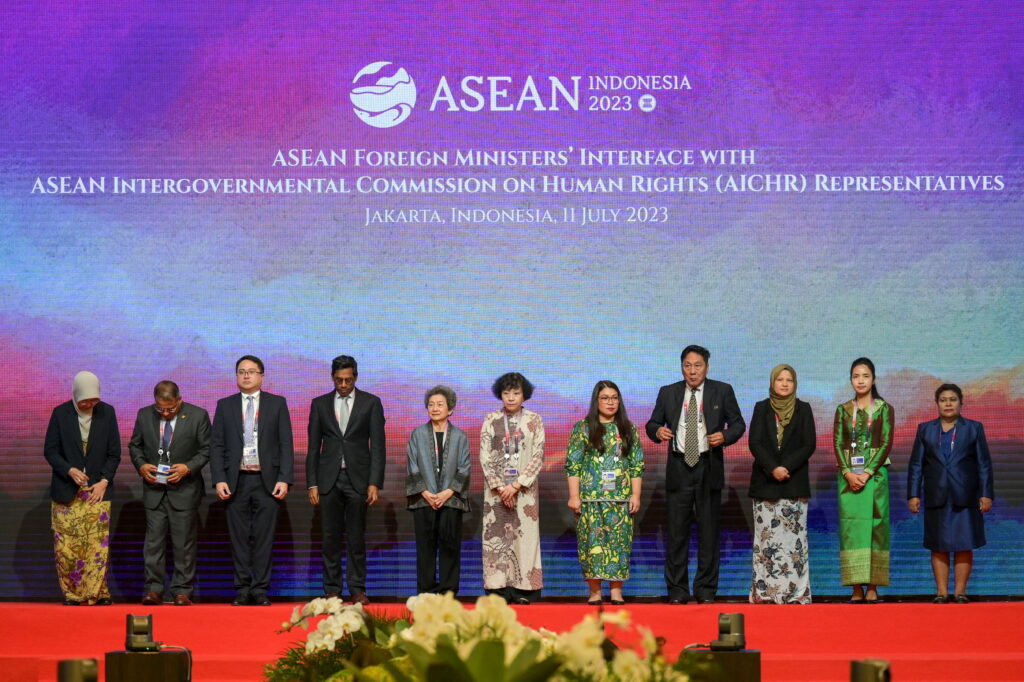The year 2024 marks the 15th anniversary of the ASEAN Intergovernmental Commission on Human Rights (AICHR). While the endorsement of human rights is vital, the AICHR leaves a lot to be desired. In its 15 years it has done little in word or in deed to prevent human rights abuses and must evolve to effectively tackle these issues in the region.
The AICHR drafted the ASEAN Human Rights Declaration, which was adopted in 2012 at the 21st ASEAN Summit. It is considered by many advocates and scholars to fall short of basic international standards of human rights. It embodies principles of sovereignty and non-interference, but most importantly identifies duties that are as important as rights. It also uses the language of human rights understood in the context of ‘regional particularities’. This language is reminiscent of the discredited ‘Asian values’ debate, a less than stellar beginning for the human rights mechanism.
George Yeo, former Singaporean foreign minister, once remarked that while the AICHR did not have teeth, it ‘at least [has] a tongue, and a tongue will have its uses’. But Yeo’s words have rung hollow. Since the AICHR’s establishment, ASEAN has faced four major incidents of human rights abuses, and in each case did not speak up or issue a single collective statement.
The AICHR did not condemn the 2014 coup in Thailand or call for the restoration of democracy. Thailand’s representative at the time, Dr Seree Nonthasoot, went as far as to say that ‘we all know AICHR has a tacit agreement not to discuss such an issue’.
During and after the 2017–2018 mass expulsion and alleged genocide of the Rohingya from Rakhine State, in which over 1.2 million Rohingya were displaced, the AICHR again did not raise a single question to Naypyidaw. Indonesian and Malaysian AICHR representatives issued statements, but only in their individual capacity.
Upon becoming president of the Philippines in 2016, Rodrigo Duterte announced a ‘War on Drugs’. Subsequent violence, much of which was allegedly perpetrated by state officials, led to the death of over 12,000 people as reported by Human Rights Watch.
When the Myanmar military seized power in the February 2021 coup, the AICHR again did nothing. Instead, former AICHR representatives issued a statement of condemnation and called for return to democratic processes in the country. Since the coup, Myanmar has spiralled ever deeper into conflict and civil war.
This silence raises concerns about the effectiveness of the AICHR as a regional human rights mechanism. The AICHR’s Terms of Reference dictate that it operates according to the region’s method of doing business, the ‘ASEAN Way’. The ASEAN Way centres on principles of state sovereignty, non-interference and consultation and consensus for decision-making. This essentially gives every ASEAN member a veto over all agendas and initiatives — meaning the AICHR is held to the standard of the region’s most troublesome member.
AICHR representatives, while nominally independent, often view themselves as government representatives instead of national representatives. This leads representatives from conservative states especially to view their role as protecting their governments rather than their people.
Another barrier to effective action is that the AICHR lacks a complaints mechanism, breaking the link between people and the member states at a collective level. At an individual level, national representatives receive complaints and forward these onto national bureaucracies. So far, Dr Seree Nonthasoot and Indonesia’s representative Yuyun Wahyuningrum have done so and both received no response to their complaints. These representatives, as well as others, have played active roles — but always as individuals and not as part of an AICHR collective.
AICHR’s Terms of Reference state that the terms ‘shall be reviewed every five years’, but after 15 years no revision has taken place, limiting future prospects. In 2019, ASEAN foreign ministers agreed to convene a high-level panel to study and propose revisions to the AICHR’s mandate. As of June 2024, only Cambodia, Indonesia, Malaysia, Thailand and the Philippines have nominated representatives.
It can only be inferred that some ASEAN states are content with how the AICHR performs. The AICHR was never intended to be a powerful body or to challenge state power. It has not interacted with the UN human rights system or national bodies. The AICHR operates alone at the regional ASEAN level, carrying out activities of limited impact while providing a veneer of human rights legitimacy.
It is difficult to see the relevance of the AICHR in its current form or any measurable impact on the people of the region. But it is commendable for ASEAN states to endorse the establishment and maintenance of a human rights mechanism. With the human rights agenda of the West now fading, China’s rise in the region and ASEAN’s democratic backsliding, it is unclear whether the AICHR will ever evolve and become a beacon of hope and protection for people in the region. Only time will tell.
William J Jones is Assistant Professor of International Relations at Mahidol University International College, Thailand.


Leave a Reply